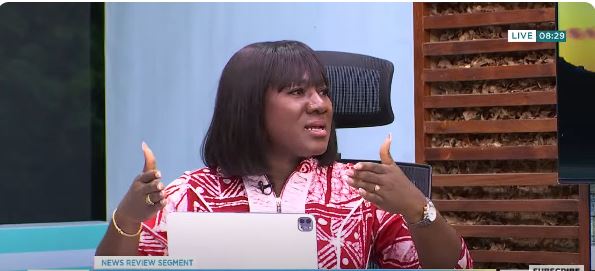Akosua Manu, a former parliamentary candidate for the New Patriotic Party (NPP), has leveled severe criticism against the Mahama administration, characterizing recent political developments as a “bloodless coup” disguised as a national reset. She argues that the government’s actions, including the suspension of Chief Justice Gertrude Torkornoo and the raid on the home of former Bank of Ghana Governor Ernest Addison, represent a calculated assault on Ghana’s democratic institutions and a systematic dismantling of the principles of good governance. Manu contends that this so-called “reset” is a thinly veiled power grab aimed at consolidating control over key state institutions, rather than a genuine attempt to improve governance or deepen democracy. Her remarks, delivered on a televised interview, reflect a growing concern among opposition figures about the direction of the country under the current administration.
Central to Manu’s argument is the belief that the Mahama administration is deliberately undermining the judiciary and eroding public trust in the institution. She acknowledges that public confidence in the judiciary has historically been a challenge, citing the infamous murder of judges as a significant turning point in public perception. However, she maintains that successive NPP governments have worked diligently to rebuild that trust, implementing reforms and promoting judicial independence. Manu alleges that the current government is reversing these hard-won gains, jeopardizing the integrity of the judicial system and weakening the rule of law. She sees the suspension of the Chief Justice as a particularly egregious example of this trend, arguing that it sets a dangerous precedent and further erodes public confidence.
Beyond the judiciary, Manu points to a broader pattern of what she perceives as authoritarian tendencies. The raid on the former Bank of Ghana Governor’s residence, conducted without a warrant, is highlighted as a stark demonstration of the government’s disregard for due process and individual rights. She argues that such actions create a climate of fear and intimidation, discouraging dissent and silencing critical voices. This, she claims, is part of a larger strategy to consolidate power and suppress opposition, ultimately undermining the foundations of Ghana’s democracy. Manu’s critique underscores a wider anxiety about the potential erosion of democratic norms and the increasing concentration of power in the hands of the ruling party.
Furthermore, Manu links the government’s actions to a perceived decline in economic performance and overall well-being. She notes rising prices, unreliable electricity supply, and job losses as evidence of the administration’s mismanagement. She argues that these economic hardships are not merely the result of unforeseen circumstances or global trends, but are a direct consequence of the government’s policies and priorities. By linking the alleged assault on democratic institutions with economic decline, Manu paints a picture of a government failing on multiple fronts, further solidifying her argument that the “reset” is a cynical ploy rather than a genuine reform effort. This connection between economic hardship and democratic backsliding forms a key component of her critique, suggesting that the government is using the pretext of a national reset to mask its failings and consolidate its grip on power.
Manu’s characterization of the Mahama administration’s actions as a “bloodless coup” represents a significant escalation in the political rhetoric surrounding the government’s policies. This stark language reflects the deep divisions within Ghanaian politics and the growing polarization of public opinion. While her critics might dismiss her claims as hyperbolic or politically motivated, her concerns resonate with a segment of the population that is increasingly disillusioned with the government’s performance. The use of such strong language also highlights the high stakes of the political debate in Ghana, as concerns about democratic erosion and economic instability continue to fuel tensions.
In conclusion, Akosua Manu’s accusations against the Mahama administration represent a serious indictment of the government’s policies and intentions. Her portrayal of the “national reset” as a thinly veiled power grab, aimed at dismantling democratic institutions and consolidating control, raises fundamental questions about the direction of Ghana’s political trajectory. Whether or not one agrees with Manu’s assessment, her criticisms cannot be easily dismissed. They reflect a growing unease about the state of Ghana’s democracy and the potential for further erosion of fundamental rights and freedoms. The ongoing debate sparked by Manu’s remarks underscores the importance of vigilance and active engagement in safeguarding democratic principles, particularly during times of political and economic uncertainty. The future of Ghana’s democracy may well depend on the ability of its citizens and institutions to hold their leaders accountable and ensure that the principles of good governance are upheld.














